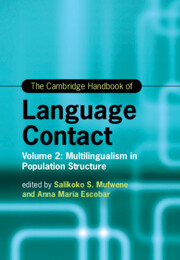Book contents
- The Cambridge Handbook of Language Contact
- Cambridge Handbooks in Language and Linguistics
- The Cambridge Handbook of Language Contact
- Copyright page
- Contents
- Maps Volume II
- Figures Volume II
- Tables Volume II
- Contributors
- Preface
- Introduction
- Part One Multilingualism
- Part Two Contact, Emergence, and Language Classification
- Part Three Lingua Francas
- Part Four Language Vitality
- Part Five Contact and Language Structures
- 22 Structural Outcomes of Language Contact
- 23 The Emergence of Andean Spanish: Against the Odds
- 24 Contact between English and Norman in the Channel Islands
- Author Index
- Language Index
- Subject Index
- References
22 - Structural Outcomes of Language Contact
from Part Five - Contact and Language Structures
Published online by Cambridge University Press: 02 June 2022
- The Cambridge Handbook of Language Contact
- Cambridge Handbooks in Language and Linguistics
- The Cambridge Handbook of Language Contact
- Copyright page
- Contents
- Maps Volume II
- Figures Volume II
- Tables Volume II
- Contributors
- Preface
- Introduction
- Part One Multilingualism
- Part Two Contact, Emergence, and Language Classification
- Part Three Lingua Francas
- Part Four Language Vitality
- Part Five Contact and Language Structures
- 22 Structural Outcomes of Language Contact
- 23 The Emergence of Andean Spanish: Against the Odds
- 24 Contact between English and Norman in the Channel Islands
- Author Index
- Language Index
- Subject Index
- References
Summary
The chapter re-positions the study of contact-induced language change in the context of the individual user’s management of a complex repertoire of linguistic structures. Taking as a point of departure the assumption that for multilinguals, boundaries among “languages” are permeable and subject to users’ creativity, I draw links between structural outcomes of contact and the inherent functions that structural categories have in information processing in communication. Topics covered include code-switching, lexical borrowing, functional and grammatical borrowing, and convergence and contact-induced grammaticalization. I examine proposed hierarchies of borrowability in lexicon and grammar, and revisit the notion of “constraints” on borrowing. I argue in favour of an epistemology that identifies trends as worthy of attention even if isolated exceptions exist; and which seeks to derive explanatory models from such cross-linguistic trends. I conclude that the study of structural outcomes of language contact can contribute to a better understanding of the language faculty itself, and possibly even of key aspects of the evolution of human language.
Information
- Type
- Chapter
- Information
- The Cambridge Handbook of Language ContactVolume 2: Multilingualism in Population Structure, pp. 593 - 617Publisher: Cambridge University PressPrint publication year: 2022
